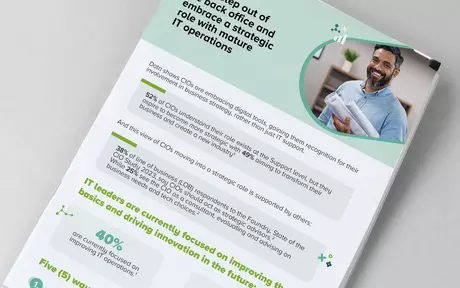Why CIOs need ERP to meet the data demands of AI
It’s up to the CIO to not just set digital transformation in motion, but to adapt systems and advance their ERP instance to remain sustainable and meet the modern demands of trending technologies like AI, and other data needs.
Organizations like professional services firms, public sector organizations, nonprofits, and higher education institutions, can use AI in their ERP systems to boost decision-making, operational efficiency, and overall outcomes - but this transformation comes with unique challenges.

In this blog we explore the potential of AI, the data demands it creates, and the key role of the CIO within this.
The transformative potential of AI-integrated ERP systems
AI's impact on ERP systems is profound, driving efficiencies and solving sector-specific challenges.
By leveraging AI, it enhances both operational processes and decision-making capabilities, driving better outcomes particularly through automated data consolidation and management.
The ability to manage vast datasets is crucial, and Cloud platforms come into play here, with 59% of organizations using them to scale AI initiatives efficiently, as reported by Cloud Data Insights.
Consolidating data is another critical step, as reported by VansonBourne. 92% of organizations report that doing so would significantly improve financial reporting accuracy, with many organizations struggle to achieve a single source of truth for their financial data, with 73% acknowledging this as a critical gap.
92%
of organizations
mentioned that data improves financial reporting accuracy
Despite the promise of AI, barriers persist, made clear by Inside AI News - 32% of organizations cite data management challenges as their top obstacle to adopting AI.
Sector-specific use cases for AI-driven optimization
Different sectors can use AI to target the unique obstacles they face, driving even greater value for technology implementation by the office of the CIO
Professional services firms
- AI-driven resource optimization: Match consultants to projects based on skills, availability, and past performance, maximizing both efficiency and profitability.
- Enhanced client engagement: Use predictive insights to deliver personalized client experiences and foster stronger relationships.
- Agile project delivery: Leverage real-time data to enable flexible service models and faster completions.
Public sector
- Operational efficiency and cost control: Automate processes like procurement and budgeting to minimize waste and ensure smoother administration.
- Data-driven policy formulation: Break down organizational silos with data visibility that drives actionable insights.
- Transparency and accountability: Employ AI-driven reporting tools to monitor compliance and build public trust.
Non-profit organizations
- Mission-driven resource allocation: Align funding with program needs using AI for maximum impact.
- Donor and volunteer management: Automate engagement strategies while forecasting donor trends for targeted fundraising campaigns.
- Real-time impact reporting: Offer stakeholders clear and transparent results to demonstrate program success.
Higher education institutions
- Student-centric administration: Reduce dropout rates and improve enrollment with AI-powered student advising tools.
- Research and grant management: Simplify administrative tasks, allowing researchers to focus on innovation.
- Skills alignment with workforce trends: Leverage AI to track market trends and align curricula, ensuring graduates are career-ready.

See our solutions
for CIOs
Watch short demo videos that focus on the key challenges IT leaders and their teams face today.
How can CIOs ensure that your ERP can meet the data demands of AI
CIOs play a critical role in ensuring data practices are primed for AI-driven ERP systems. They must ensure that their ERP, as well as the organization at large, is ready to handle AI and the data practices it demands.
CIOs can revolutionize the strategic capabilities of their organization, but they must ensure that data demands are met and prioritized.
Assess and standardize data practices
Aligning fragmented datasets into cohesive platforms is the first step toward AI readiness. By implementing robust data hygiene and governance practices, CIOs can eliminate fragmentation and prepare systems for predictive analytics.
Foster leadership engagement across teams
Collaboration is essential for successful AI integration. CIOs must secure executive buy-in and cultivate a culture that values teamwork for ERP adoption. By positioning AI as a strategic asset aligned with organizational goals, leaders can drive adoption across all levels and ensure that data practices are adhered to.
Leverage ERP as an AI catalyst
With tools like Unit4 ERP, CIOs can unify siloed data and gain holistic insights. Predictive analytics, powered by AI, can transform both operational workflows and strategic planning, enhancing efficiency and decision-making. Without ERP, the data demands of AI could be unmanageable.
Prioritize short-term wins
Start by auditing existing ERP and data systems to identify immediate opportunities for AI-driven improvements. Quick optimizations, such as using predictive analytics in procurement or donor management, often deliver immediate ROI while building momentum for larger initiatives.
Tailor AI implementation by your industry’s needs
CIOs must recognize the unique demands of their specific sectors and adapt AI strategies accordingly. A deep understanding of these unique needs is key to implementing effective solutions to the most pressing issues, whether that’s meeting demand in the public sector, or providing an optimized user experience for nonprofits.
How can Unit4 ERP help you prepare for the data demands of AI
CIOs are at the forefront of transforming organizations to thrive in an AI-driven world. By addressing data management challenges, fostering collaboration across teams, and leveraging adaptable ERP systems like Unit4, they can unlock the full potential of AI.
Unit4’s AI-ready ERP paves the way for success in service-centric organizations, offering scalable tools to enhance human expertise, streamline operations, and achieve transformational growth.
Unit4 ERP’s innovative SaaS offerings are designed to scale AI initiatives without overhauling existing infrastructure. This modular approach allows organizations to adopt AI incrementally, making the process more manageable and cost-effective.
Discover how Unit4’s AI solutions can transform your organization. Explore our AI product innovation or experience Unit4’s AI with a tailored demo, to see the power of AI-integrated ERP in action, or talk to sales today.








